TOPIC: FIREFOX
Running Internet Explorer on Linux
7th July 2008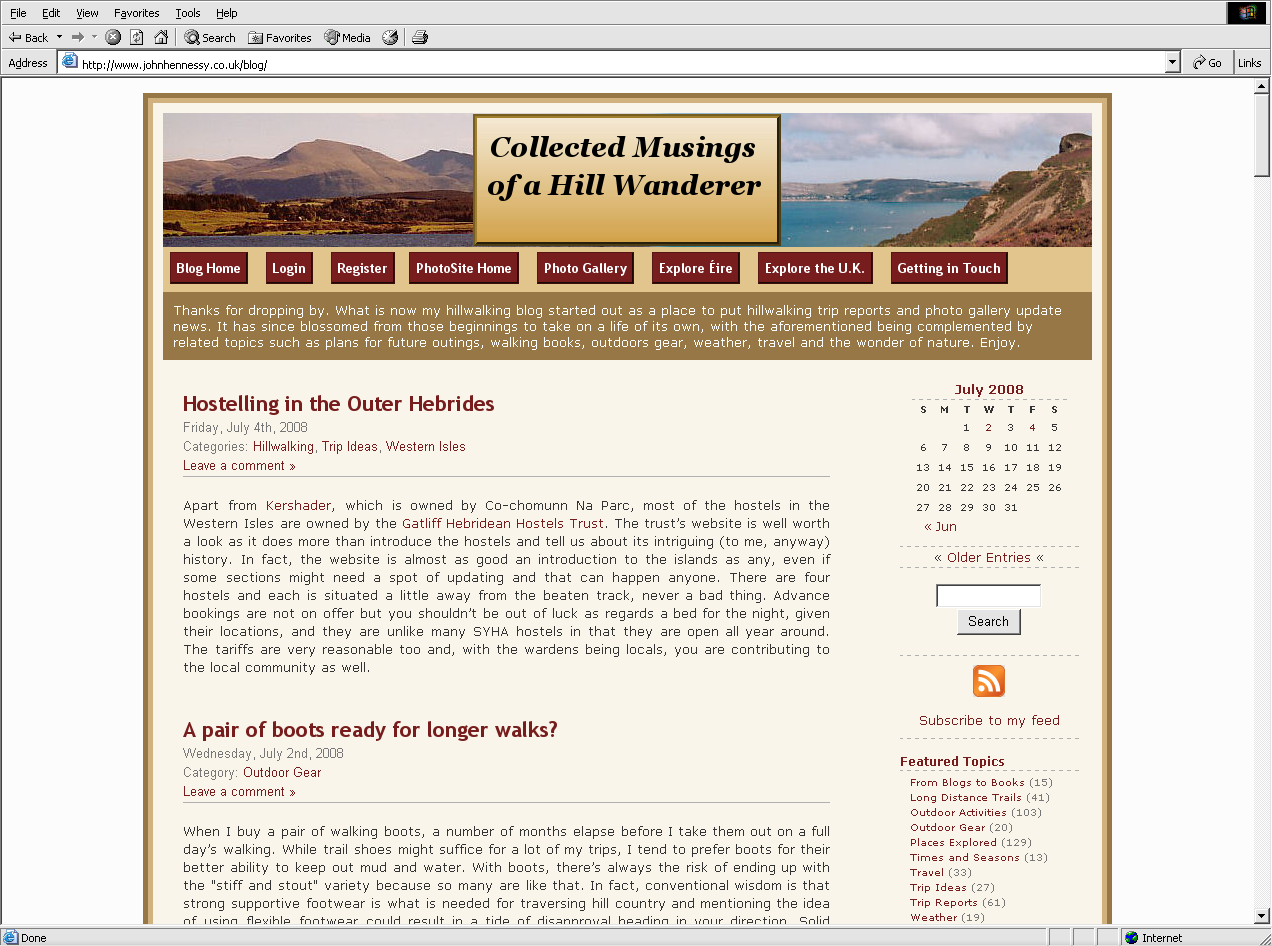
On first sight, this probably sounds daft given how good Firefox is, yet you cannot ignore those surfing the web using the ever pervasive Internet Explorer when doing some web development. Though using virtualisation is a solution to the need, it can mean that you need to set up a web server with Perl, PHP, MySQL and the like in a virtual machine, all for a little offline testing and then there's the potential for a lot of file copying too. Otherwise, you are trying to sneak things online and catch the glitches before anyone else does, never a good plan.
Therefore, having the ability to run IE to test your offline LAMP set up is a boon, and IES4Linux allows you to do what's really needed. Naturally, WINE is involved, so some flakiness may be experienced, even after the ever useful API library's reaching version 1. Otherwise, all usually runs well once you work your way through the very helpful instructions on the IES4Linux website. I did get a misplaced message about the version of WINE that I was using, and Python errors made a worrying appearance, but neither compromised the end result: a working IE6 installation on my main Ubuntu box.
IE5 and IE5.5 are also on offer if you're interested but, after looking at my visitor statistics, I think that I can discount these. IE7 and the work-in-progress IE8 make no appearance on the availability list. The absence of IE7 is not a big problem as it might appear because coding for IE6 sufficiently suffices for IE7, even now; IE8 may not be the same in this regard, but we shall see. Even so, a later browser release does mean a more secure version, and I reckon that including IE7 should be next on the project's to-do list. Saying that, what we have now is far better than nothing at all.
Eliminating Peekaboo content display problems in Internet Explorer
1st July 2008Recently, I changed the engine of my online photo gallery to a speedier PHP/MySQL-based affair from its PHP/Perl/XML-powered predecessor. On the server side, all was well, but a peculiar display issue turned up in Internet Explorer (6, 7 & 8 were afflicted by this behaviour) where photo caption text on the thumbnail gallery pages was being displayed erratically.
As far as I can gather, the trigger for the behaviour was that the thumbnail block was placed within a DIV floated using CSS that touched another DIV that cleared the floating behaviour. I use a table to hold the images and their associated captions in place. Furthermore, each caption was also a hyperlink nested within a set of P tags.
The remedy was to set the CSS Display property for the affected XHTML tag to a value of "inline-block". Within a DIV, TABLE, TR, TD, P and A tag hierarchy, finding the right tag where the CSS property in question has the desired effect took some doing. As it happened, it was the tag set, that for the hyperlink, at the bottom of the stack that needed the fix.
Of course, it's all very fine fixing something for one browser, but it's worthless if it breaks the presentation in other browsers. In that vein, I did some testing in Opera, Firefox, Seamonkey and Safari to check if all was well and it was. There may be older browsers, like versions of IE before 6, where things don't appear as intended, yet I get the impression from my visitor statistics that the newer variants hold sway anyway. All in all, it was a useful lesson learnt, and that's never a bad thing.
An option for when BBC's iPlayer will not allow you to "Listen Again"
14th June 2008Following my move to Firefox 3, the BBC's iPlayer became problematical again. While I eventually sorted it after a fashion, I am noting an option for the frustrated before talking more about that. Finding the links to the ram files for the BBC's Listen Again service can be a nightmare because of the Beeb's reliance on JavaScript to cloak things up, so it's useful to find somewhere where things have been deconvoluted for us. That's The Beebotron. It's really meant for users of the mobile internet, yet it serves well for those times when a mismatch between Firefox and RealPlayer on Linux derails the more usual way to do things.
Better font display in Firefox 3 on Ubuntu
12th June 2008Now that all bar one of the Firefox plugins that I use have been updated to work with it, I have finally jumped ship to 3 from 2.0.x. The move wasn't without its travails, though. For one thing, Google Toolbar stopped working, and I resorted to Googlebar Lite instead for my needs. Apart from that, the only other irritation has been the appearance of fonts in the new version.
In Firefox 2, it would seem that I was getting away without tweaking my system settings to be their most optimum. With 3, I could do that no longer because of an irritating and pervasive fuzziness that particularly afflicted k's and w's. The way out of this turned out to involve changing my Appearance Preferences (Preferences > Appearance from the System menu). The required attention was focussed on the Fonts tab, whereupon the Details button was brought into use.
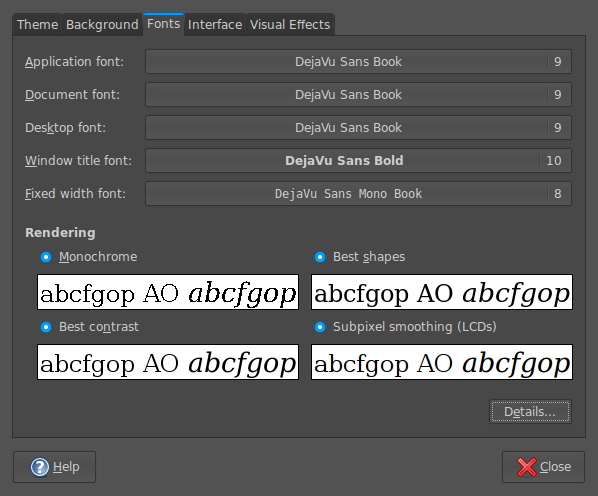
In the resulting dialogue box, smoothing was set to "Subpixel (LCDs)" and hinting to "Slight". Closing down everything after making the required selections and a restart of Firefox was all that was needed to improve matters and more completely make myself at home with Firefox 3.
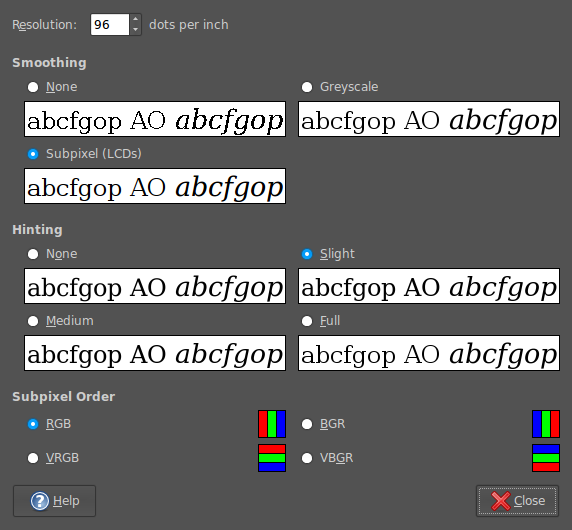
Opera and table display
15th March 2008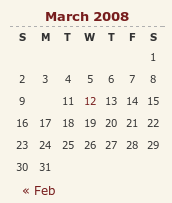
I have encountered something very strange with my hillwalking blog, and I have to admit that am at something of a loss as to how to resolve it. Opera (version 9.x), it seems, is not displaying the date corresponding to the first post of a particular month. You can see the effect on the right for the current month and, yes, the tenth of the month has a post associated with it. What compounds the mystery is that the same issue doesn't affect this blog, so some further investigation is very much in order. However, the cascading element of CSS doesn't help much when trying to track down the cause of this sort of thing. While, it's irritating, I don't have any definite answers yet and so would appreciate some suggestions. Meanwhile, I'll be staying on the lookout for a fix. Curiously, all's fine on Firefox and IE.
Trying out Firefox 3 Beta 3 on Ubuntu
20th February 2008Keeping an eye on future browser releases helps to avoid any shocks when maintaining publicly available websites. Therefore, it should come as no surprise that I have been giving Firefox 3 a whirl. As it happens, I have had it going on both Windows and Ubuntu. With the former, I have not encountered any obvious problems, but I am wondering if the new bookmarking system will mean anything to me. For installation on Ubuntu, I used the following command (I think that I culled it from Tombuntu but can't remember offhand...):
wget -P ~ ftp://ftp.mozilla.org/pub/firefox/releases/3.0b3/linux-i686/en-US/firefox-3.0b3.tar.bz2 && tar xjf ~/firefox-3.0b3.tar.bz2 -C ~
The nice thing about the above is that it places the test installation in your home directory and away from Firefox 2. It also works regardless of what Linux distribution you have. The profiles get shared between versions, so a backup would be a good idea before you start to tinker. As with the Windows version, page loading and rendering is faster in the new version, but I found a problem with printing that, I hope, will get sorted before the final release. Another area for attention is font rendering: it could be sharper for sans serif fonts on Ubuntu and serif fonts on Windows. Otherwise, it works well on both platforms and I like the way that open windows are saved on exit, an excellent idea carried over from Opera.
Getting BBC iPlayer going on Ubuntu
27th January 2008Following on from my earlier musings on the subject, I finally have got the BBC's iPlayer going on my Ubuntu set up. To accomplish this, I needed to get my hands on the plug-in files nphelix.so and nphelix.xpt. Once that was done (more on how I did that later), I popped the former into /usr/lib/firefox/plugins, the latter into /usr/lib/firefox/components and restarted Firefox. I think that a system restart might have helped me too, even if it was done for another reason. The files themselves were culled from the RealPlayer folder populated by the installer (realplay-10.0.9.809-linux-2.2-libc6-gcc32-i586.bin was what I used) that I had downloaded from the Helix Community website; the plugin files were found in the mozilla subfolder under RealPlayer.
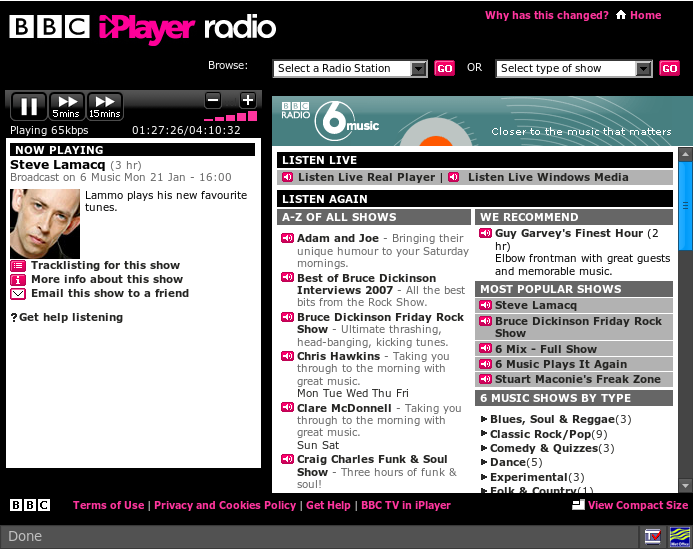
Another thing that I did was to fire Alacarte, Gnome's menu editor, and add Configuration Editor (also known as GConf, I believe) to the System tools submenu on the Applications menu. Once added to the menu, I fired up the said application. Navigating to desktop > gnome > url-handlers > rtsp, I changed the command to realplay "%s". While I don't know if this helps, it certainly was no hindrance and I got the result that I wanted and in high quality audio too.
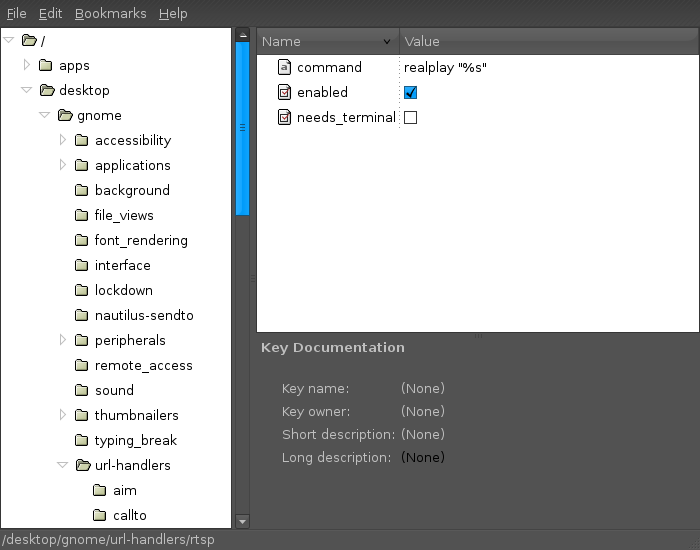
Setting up automatic Firefox updates on Ubuntu with Ubuntuzilla
1st December 2007No sooner had we received Firefox 2.0.0.10 than they have already started talking about 2.0.0.11. Apparently, the latest update broke support for a tag that I have never used: canvas. This is stuff that makes you wonder about their quality control.
Because the 2.0.0.10 was a security update, Ubuntu volunteered it to me without any effort on my part. However, I am using Ubuntuzilla, so I didn't get the update coming through to my browsing world without further intervention. Launching Firefox using the gksu command allowed me to update the thing like I have been doing on Windows: Help > Check for Updates... Now, I have got a more permanent check set up, thanks to my issuing the following command:
ubuntuzilla.py -a installupdater -p firefox
A different Firefox…
17th November 2007On Ubuntu, I made a move to using Ubuntuzilla's deployment of Firefox. Because Firefox's Gecko engine is used by other parts of Ubuntu, any Firefox updates issued by Mozilla don't come through straight away. The idea of using Ubuntuzilla is that you get Mozilla's latest, be it Firefox, Thunderbird or Seamonkey, without having an impact on the rest of the Linux installation; while Ubuntu's Firefox is left in place, you are now presented with the vanilla Firefox for all your web surfing needs. Visually, there's not much change but for the built-in Firefox application fonts coming through in the new instance, a strange sight when you see Ubuntu's more subtle alternatives everywhere else. I tried the new tack to see if picked up RealPlayer in place of Xine, but that sadly has not been the case. Nevertheless, I now have 2.0.0.9 and the latest improvements this side of version 3.
BBC Radio Player and Linux
13th November 2007It's been a while since I mentioned anything that might be aurally related, and then this rears its head. The Xine plugin beloved by the instance of Firefox on my Ubuntu box simply refuses to play ball with the BBC's Listen Again feature; 6Music shows are what I am trying to catch later. RealPlayer is on the system, but Firefox simply refuses to locate it. On its own, it plays live radio from the BBC and Ireland's Today FM but, unless I need to do some digging, that's not much use for the Listen Again service. It may be some hard-wiring done by Canonical as part of their packaging of Firefox: might be related to their preference for Free Software. If I can be bothered, I might replace it with the usual version to see if RealPlayer can be picked up: I do seem to remember reading somewhere that this was a possibility...
Yes, I could use one of my Windows VM's, but I have found another way courtesy of openSUSE 10.3. No, I haven't changed Linux distro, yet the reason that openSUSE has made a sudden appearance on this blog in recent times has got to do with my acquiring a copy of the latest issue of Linux Magazine. It came emblazoned with a DVD containing both 32-bit and 64-bit variants of openSUSE's latest version and, wanting to have a look at how KDE appears these days, I knocked up a VM and installed the 32-bit variant thereupon.
Unexpectedly, that has afforded a Linux solution to my BBC Radio Player conundrum. openSUSE's Firefox instance can find RealPlayer once you have it installed. That process involves a spot more work than if it was Free Software: you need to add an extra software repository to YaST (openSUSE's configuration utility). The breadcrumb trail is YaST -> Software -> Software Repositories and hitting the Add button fires up a wizard that needs the following settings to set things up as needed:
Protocol: http
Server Name: download.opensuse.org
Directory on server: /distribution/10.3/repo/non-oss/suse/
Authentication: anonymous
Once the new repository was set up (I named it Non-OSS), I found the RPM and YaST took care of the rest. So, what started out as an exercise in curiosity has now found a use. While network traffic may cause playback to stutter, I have what I want without once starting up Windows. Sorting out Ubuntu may happen, but it is a lesser priority and I don't want to disrupt my computing environment in any event.